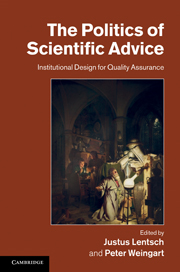Book contents
- Frontmatter
- Contents
- List of figures
- List of tables
- Acknowledgements
- Biographical notes
- Part I Methodological issues: quality control and assurance in scientific policy advice
- Part II Collegial science advisory bodies
- 5 Knowledge, advice and influence: the role of the UK Royal Commission on Environmental Pollution, 1970–2009
- 6 International Commission on Radiological Protection: policy and worldwide standards
- 7 The European Commission and the collection and use of science and technology advice
- Part III Collegial science policy advisory bodies
- Part IV Research-based advisory organisations
- Part V Academies of science
- Index
- References
7 - The European Commission and the collection and use of science and technology advice
Published online by Cambridge University Press: 25 October 2011
- Frontmatter
- Contents
- List of figures
- List of tables
- Acknowledgements
- Biographical notes
- Part I Methodological issues: quality control and assurance in scientific policy advice
- Part II Collegial science advisory bodies
- 5 Knowledge, advice and influence: the role of the UK Royal Commission on Environmental Pollution, 1970–2009
- 6 International Commission on Radiological Protection: policy and worldwide standards
- 7 The European Commission and the collection and use of science and technology advice
- Part III Collegial science policy advisory bodies
- Part IV Research-based advisory organisations
- Part V Academies of science
- Index
- References
Summary
Introduction: scientists advise – policymakers decide
Winston Churchill said: ‘Scientists should be on tap not on top.’ The quotation is taken from an interview with his son (Churchill 1965: 127).
Randolph Churchill:
Experts must always be firmly controlled by men with rather perhaps less nimble and exact minds but men with broader minds and well-established characters.
Irving:
Your father had a lot of people round him in the war who today would be called managers, who were at the time some of them unorthodox.
R. Churchill:
Well, once he said scientists should be on tap, but not on top – a little-known remark of his.
Irving:
You think he had his scientists under control? What about Lindemann – don't you think he got a bit too much influence?
R. Churchill:
He was never allowed to interfere in politics; I often heard my father say to him ‘Now, now, Prof, that's politics. You mustn't interfere in that.’ He did have a lot of influence because he was able to translate complicated scientific facts and theories in a way my father could understand.
One of these British wartime scientists, J.D. Bernal, put it more succinctly:
But certain arbitrariness must and will remain; there often comes a point when it has to be recognised that we lack the knowledge to make an important decision and that someone will have to make the decision before we can possibly hope to get that knowledge. The function of a scientist as a scientist does not extend into this field. Responsibility for making decisions which are basically indeterminate and must take unassessable factors of human attitudes into account is the proper field of executive authority. […]
- Type
- Chapter
- Information
- The Politics of Scientific AdviceInstitutional Design for Quality Assurance, pp. 115 - 136Publisher: Cambridge University PressPrint publication year: 2011
References
- 4
- Cited by

